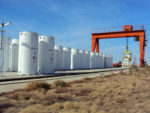
Gary J. Duarte, Director, USNEF (775) 224-2089
09/14/16 Op-Ed
Is it time for a U.S. “National Above Ground Nuclear Waste Storage Facility”?
The US Nuclear Energy Foundation has submitted a recommendation to the Nuclear Waste Technical Review Board (NWTRB) to consider the establishment of a National Above-Ground Temporary Nuclear Waste Storage Facility for America’s Spent Nuclear Fuel (SNF). USNEF a non-profit 501 (c)(3). Currently, such casks have been stored at plant locations, about 71 sites nationwide.
Congress, corporate lobbying, legislation, etc. are all hitting road blocks when it comes to dealing with national controversial “public policy issues” which government is struggling to resolve. One of these is the completion of the Yucca Mountain Repository. Issues can be resolved if only these entities would be more willing to negotiate variables. Industries who provide scientific analysis of energy technologies must coordinate with the government in educating the grassroots public on topics of this importance and magnitude. Government programs sometimes do not provide enough public awareness. We believe grassroots education by independent foundations such as USNEF by nature has a more palatable communication with the public.
A local message by a local “entity”, engaging in local grassroots messaging, provides a greatly improved potential for “community friendly acceptance.” We have to accept that bureaucratic stalemates are the process in Washington and they are not resolving important public problems. We need a paradigm shift in public policy messaging that reaches across party lines into the real world of the citizens affected by these programs. It is a long process to modify standard procedures, but it is important to evaluate procedures that reverse stalemate positions. If laws exist that disrupt progress, then let’s change the law, especially if conditions exist that support unified progress.
We are recommending a method to rebrand the education about (nuclear waste) and nuclear power which has been demonized for half a century. The fact is that our current U.S. stockpile of about 71,000 metric tons has a limitless potential for economic development with applied science. In 2013, a paper submitted by Kenneth D. Kok, PE to the 15th International Conference on Environmental Remediation and Radioactive Waste Management. His baseline analysis was done on 70,000 metric tons of fuel from analytical data recorded by the Energy Information Administration. Based on fissionable isotopes in spent fuel, a rule of thumb for the energy value in these materials is 1 Megawatt Day per gram. His calculations indicate that the value of this 70,000-ton stockpile is $14 trillion dollars when extended through the entire cycle (2013) dollars.
The dilemma with Washington is the investment into a commercial reprocessing facility large enough for our current 70,000 MT (and more to be added annually) as the NRC has renewed 81 power plant reactors nationwide to run for up to 100 years. An inclusive reprocessing facility could cost between $33 and $45 billion but, its market value is in the trillions. Everything nuclear in cost calculations should be amortized over 70 years because that is the original designed functioning life of the first and second generation nuclear plants. Advanced technology and materials development can easily move this to 100 years.
The shutdown of Yucca Mountain has already cost taxpayers $12 billion in legal suits, estimated to be $20 billion by 2020. This is for non-performance by the contract of the DOE, for non-removal of the power companies’ onsite nuclear storage. It would be much more practical for these funds to be applied to the construction of a national temporary storage facility basically storing it to a multi-trillion-dollar safe deposit vault. We know that the world’s 270,000 MT of used fuel can be reprocessed, the issue has always been an economic investment, and market competitive costs when it is recycled. Also, with the development of molten salt reactors which are designed to be capable of burning that spent waste provides a secondary reusable market. When science and engineering provide a resolution, this is when Congress should focus on the logically based decision, making an educated constituent decision, for their public service, not on Congressional bickering.
Nevada has several locations that would be an excellent site for a national above ground spent nuclear fuel facility. Our current mission is to educate the grassroots constituents on the common sense of “logical” resolutions and having our citizens bring this message to their representatives to engage and solve.
There is a degree of consideration with or without the DOE completing or re-siting a permanent storage facility at Yucca Mountain. A high probably exists that the final selection site would be located in an expansive desert location in the Western U.S. This makes Nevada an ideal CENTRAL location for such a temporary above ground transfer facility. Nevada offers 100% security as our military test ranges provide a high-security profile over much of the desert land mass.
Gary J Duarte, President, Director
US Nuclear Energy Foundation
The U.S. Nuclear Energy Foundation is a non-profit organization dedicated to providing accurate information on nuclear energy. The NEF has the goal of mobilizing citizens in Nevada and across the U.S. to design and build new “4th generation nuclear power reactors and spent fuel reprocessing technology”. The National Security Forum is pleased to be able to bring to the attention of our members the work that Gary and the Foundation are doing.


